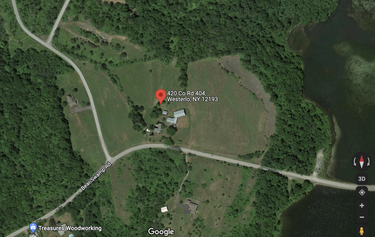Westerlo Planning Board votes to move embattled wedding venue app to public hearing
WESTERLO — Almost a year after Angela Carkner submitted her application for a special-use permit to turn her 20-acre Westerlo property into a seasonal wedding-and-events venue, the Westerlo Planning Board has finally moved to schedule a public hearing, even though it’s still awaiting a stamped site plan from Carkner, as required by the town’s zoning law.
Carkner, who owns and manages two restaurants in Albany County, maintains that she should not need to submit a stamped site plan to the Westerlo board, citing her experience before other planning boards.
“I was able to complete a residential-to-commercial rezoning in two meetings in the city of Albany,” Carkner told The Enterprise earlier this month. “And that was a drawing I had done in a paint application on my computer.”
She said that the Westerlo Planning Board is “holding me to quite a high standard.”
In addition to the plan, which must be stamped by an architect, engineer, or surveyor, Carkner said that the Westerlo Planning Board asked her to put $6,500 in escrow so that the town attorney and engineer can review her site plan once it’s submitted.
She said they also asked that she get signed feedback on various aspects of the plan from the county watershed manager, because her property is directly adjacent to the Basic Creek Reservoir; the Department of Public Works, because of the anticipated change in traffic through the property’s driveway; and emergency services.
Westerlo Planning Board Chairman Beau Loendorf told The Enterprise this week that the county planning board said in March that the county’s health department also needed to be consulted.
Carkner’s husband said at the April 12 meeting that “every person that you guys have asked us to [contact] have ultimately laughed in our face” because they thought the requests were unusual. Nevertheless, Loendorf said that all those requirements have been fulfilled.
Albany County Watershed Manager Amy Walsh told The Enterprise this week that, while the request for a water board review itself was not unusual, the request for a letter of approval was.
“From what I understood the Town recommended, or required, Angela Carkner to have her plans reviewed by the Albany Water Department to see if there would be any activities that did not align with the Watershed Rules and Regulations that govern activities around our reservoirs and tributaries,” Walsh wrote in an email to The Enterprise. “This was not an unusual request. The request for a letter of approval from the Water Board to the Town Planning Board seemed to be unusual as the Water Board does not have any jurisdiction in this matter.”
Adding to Carkner’s frustrations has been a contingent of residents who oppose her plans and have been airing their concerns at planning board meetings, despite those meetings being primarily about what Carkner needs to include in her application.
“There was one meeting where I was berated for over two hours by the neighbors,” Carkner said, adding that she left that meeting “in tears.”
Legal action threatened
Carkner ultimately hired a lawyer, Matthew Seeber, of Klein Law Group, who, at the April 12 meeting, raised the specter of an Article 78 proceeding, which is a mechanism through which decisions made by a government agency can be challenged and, if the challenge is successful, reversed.
Seeber said at the April 12 meeting that he had reviewed eight years of Westerlo planning board meetings and found that a stamped site plan was required for a resident application only once, in 2019, for a resident who was hoping to raise a structure that was not in line with the zoning at that time. Otherwise, he said, they’ve been required for larger structures like cell towers and solar farms.
Carkner’s proposed wedding venue, meanwhile, would not require any new construction as the weddings and events would be held outdoors or in two large tents, Seeber said.
“For an Article 78 to be successful,” he said, “it’s generally based on arbitrary and capricious behavior … Simply put, that’s an action that is inconsistent with what has been done before in similar circumstances, or is against the law.”
But as already noted, both Westerlo’s zoning law — as amended in 2017 — and the Albany County Planning Board require a stamped site plan for all applications.
An Enterprise review of Westerlo Planning Board minutes since 2017, when the law took effect, shows that the majority of applications before the planning board have been for minor matters, like lot-line adjustments and subdivisions, and, as Seeber mentioned, solar and cell tower projects.
The 2019 project that Seeber referenced appears to be a proposal by Jacob Irwin, of J&J Construction, t0 build a commercial garage. The minutes state that the Westerlo Planning Board “needs Jacob’s official site plan” because “[Albany County Planning Board] will not review application until professionally rendered site plan is submitted.”
In July of 2021, the Albany County Planning Board issued a disapproval of Carkner’s application, stating that it required a more-detailed site plan “since the proposed action can have significant effects on traffic and stormwater.”
The county board also advised that the department of public works be consulted because the “change in use from residential/agricultural land to commercial use” may require an adjustment to the driveway.
It voted unanimously to approve of Carkner’s application in February, after Carkner resubmitted another site plan.
Moving ahead
Still, noting the difficulty of the process, all three of the five Westerlo Planning Board who were present on April 12 voted to waive the escrow requirement for Carkner’s application so that she doesn’t incur more costs, and also to amend the site-plan requirements so that only the most relevant information is required.
And with that, the board also voted to schedule the public hearing for May 10, on the condition that a stamped site plan is submitted at least five days prior to the hearing.
“It’s a commitment on us,” Loendorf told the board before the vote, referring to the necessary effort to review the plan in a relatively short time frame.
Carkner and Seeber declined to comment further for this article because the matter is ongoing.
Loendorf told The Enterprise after the meeting that he had sympathy for Carkner, acknowledging that “every application is a lot of work,” and also the fact that his taking over the planning board in November after the former chairwoman, Dotty Verch, moved out of town, may have caused some hiccups.
He also said that although residents’ comments about the proposal itself were not necessarily relevant to the matter at hand, some of their concerns have been addressed and will not need to be revisited during the public hearing.
In spite of all that’s gone on, Loendorf said, “I think the process has been fair. I know it’s been tough for her, and any time you transition leadership there’s going to be a little bit of an adjustment. However, from day one, I’ve been in open communication with her.”
He added that, without a stamped site plan, he could have struck the matter off the agenda, but allowed conversations about what was necessary to continue so that progress could be made while the planning board waited for that crucial component.
“The reason we have town laws,” he said, “is to protect the town, and also to protect the residents. We need to ensure that everything is well thought-out and planned according to what is needed for the town.”



